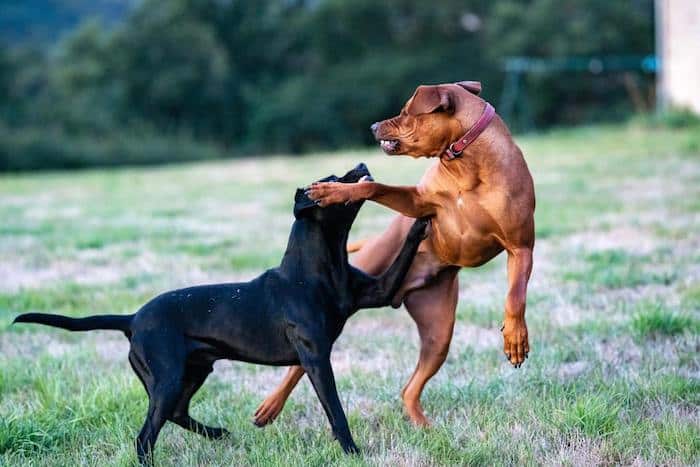Dogs are pack animals, and they live in packs of other dogs. Like lions and wolves, dogs demonstrate aggressive behavior toward members of the same sex as them (male vs. female) but also toward the opposite sex (female vs. male).
This means that there’s no single cause or reason for why dogs are aggressive towards other dogs; rather, it depends on many factors, including where they’re raised, how they were trained as puppies/dogs learn from their own experiences growing up with humans/other pets in their lives etc…
Treatment should be based on the underlying cause of the aggression
If you’re worried about your dog’s aggression towards other dogs, there are several things you can do. First, it’s essential to find the underlying cause of the aggression. Then, the type of treatment will depend on what caused it and how severe it is.
For example, if your dog has been aggressive towards other dogs but hasn’t harmed anyone or anything else in its life before this incident (like biting through someone’s pants), then behavioral modification may help teach him that he needs to be gentle with other animals when they get close enough together.
The same thing would apply if he was afraid of something nearby like a loud noise or sudden movement from another animal while outside at home one day while playing fetch with his owner(s) who were nearby watching them interact playfully together, it may also help prevent future incidents where any type could occur due to past experiences with strangers coming up close enough around them without warning first before actually approaching them too closely after noticing something wasn’t right about their behavior patterns.”
Sterilization status influences a dog’s likelihood of aggression toward other dogs
A dog’s sterilization status can influence the likelihood that a dog will display aggression toward other dogs. Dogs who have been neutered are less likely to display aggression than intact males, but their level of aggression is not necessarily lower than that of intact female dogs. Instead, neutering does not affect aggression in male or female dogs and only reduces it for females when they have already been spayed before having puppies.
There is a correlation between behavioral sex, gonadal hormone levels, and aggressive responses to canine intruders in domestic dogs.
You may have heard that dogs are more likely to mount and play with their sexual counterparts than with the opposite sex. This is true, but it’s not just because they want to get it on—it has everything to do with behavioral sex.
Behavioral sex is determined by the presence or absence of functional testes in male dogs; if your dog has functioning testicles, he will likely display behaviors associated with being male (e.g., mounting). By contrast, behavioral females show less interest in other canines and prefer interacting only with other canines that share their kind (e.g., female dogs).
There is a correlation between behavioral sex, gonadal hormone levels and aggressive responses to canine intruders.
Dogs are more likely to mount and play with their sexual counterparts than with the opposite sex.
Dogs are more likely to mount and play with their sexual counterparts than with the opposite sex. Hormones, such as testosterone, are responsible for this behavior. The hormone helps increase reproductive activity in male dogs but also causes them to be more aggressive towards other males than females.
When you see your dog mounting another dog or human (or both), it’s important not to get mad at them because they might just be acting on instinctual drives that aren’t under your control;
However, if you’re concerned about how often your pup is getting into fights with other animals, then there are things you can do that will help keep them safer while still being able to enjoy their favorite pastimes, like playing fetch!
Aggression may occur for different reasons, and treatment should be tailored specifically for each dog
- The nature of the aggression: Is it an isolated incident, or is it a behavioral problem that has been ongoing?
- The dog’s age: The older your dog gets, the more likely it is to display aggression toward other dogs.
- Also, neutering has a significant effect on a dog’s aggression. Neutered dogs are more aggressive.
- Severity of aggression: Some breeds are bred for fighting and are more likely to become aggressive than others that have not been bred for this purpose (such as Labrador Retrievers).
- environment in which they live: If you have multiple dogs living nearby, then there will be increased chances that one may try to dominate over another due to territorial instincts coming into play here too!
This can lead naturally to dominance struggles between them, resulting in aggressive behavior towards other dogs. But, at the same time, they’re still young enough that intervention can help prevent significant problems from occurring later on down the road!
Conclusion
It has long been assumed that aggression is a trait that all dogs possess. However, research indicates that this isn’t true. Instead, some dogs are more likely to exhibit aggressive behavior than others, depending on their environment and genetics. Treating your dog accordingly will ensure that they get the best care possible and avoids life-long problems caused by other dogs. I hope you like reading on Why dogs are aggressive toward other dogs?

